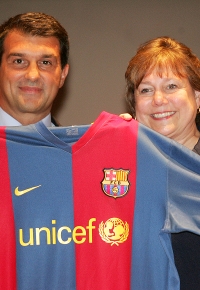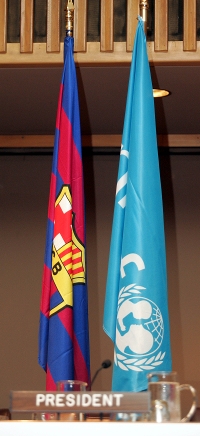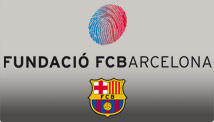FCBARCELONA.CAT
Main menu
Content menu
News article on: UNICEF


Global alliance with UNICEF for the next 5 years
UNICEF Alliance
The Fundació and FC Barcelona, as a consequence of their new position on a worldwide scale, have
signed a
global alliance with
Unicef in order to make a contribution over five years to the
Millennium Development Goals (MDG), and to support the United Nations
Organisation’s humanitarian aid projects around the world.
The Millennium Development Goals are a major challenge established by all of the most
important governments and development institutions around the world, and the aim is to achieve them
by 2015
There are eight MDG in total, while six are specifically aimed at children and these are the
ones that these two institutions will be working especially towards:
1) Reduce extreme hunger and poverty by half.
2) Achieve universal primary education.
3) Promote gender equality.
4) Reduce the mortality rate among children under five by two thirds.
5) Reduce by three quarters the maternal mortality ratio.
6) Halt the incidence of HIV/AIDS, malaria and other major diseases.
7) Ensure environmental sustainability.
8) Develop a global partnership for development, with targets for care, trade and enhanced
debt relief.
CONTRIBUTION OF FC BARCELONA
FC Barcelona will be supporting Unicef’s work by making an annual payment from its
Foundation of one million five hundred thousand euros (1.5 M. euros).
Unicef has agreed to spend a proportion of the money donated annually by the Fundació del FC
Barcelona on supporting the programmes and projects agreed in the plan of activities that they will
draw up in conjunction each year. These programmes will benefit the most vulnerable children on the
planet, mainly in Africa, Asia and Latin America with a special focus on children affected by
HIV/AIDS and other children in situations of exploitation or at risk of social exclusion.
Each annual contribution will be accepted and administered by Unicef by providing technical
and financial reports about the activities they have carried out using funds received from the
Fundació del FC Barcelona.
Barça will also support Unicef’s work by allowing them to use the club as a source of
publicity, which includes in particularly emblematic form, the charity organisation’s logo
appearing on the football team’s shirt, when in 107 years of history, no name has ever before
appeared on the Barça football jersey.
RECOGNITION BY UNICEF
Unicef has thus conceded FC Barcelona the right to use its name, logo and emblem on their
football shirt, printed in yellow on the regular shirt, and in blue on the change strip. They are
also committed to actively participating in the promotion and diffusion of the global alliance
between the two institutions for the next five years.
IMPLEMENTATION OF THE COLLABORATION DURING THE FIRST YEAR
Unicef, FC Barcelona and the Foundation are at the developmental stage of a plan of
activities for the first year of the agreement. The first beneficiaries will be the children
affected by the HIV/aids epidemic in Swaziland, a country in the south of Africa, where the
prevalence of HIV/AIDS in pregnant women is often as high as 45%, in other words, almost half of
the pregnant women have the virus, with there being a huge risk of it being passed on to their
children.
WHY HIV/AIDS?
The HIV/AIDS epidemic is one of the most important crisis situations in the history of the
human race, comparable to the Great Plague of the Middle Ages. Its impact is not just one on public
health, but also has major socio-economic, demographic, political and security effects. AIDS is
affecting the lives of many families that are suffering enough as it is in situations of extreme
poverty and social exclusion. The epidemic has not only made this situation worse, but is also
causing setbacks for the many development and cooperation projects set up over the last 30 years.
Children have until now been the “hidden face” of the epidemic, as has been the
case with so many things in the past, yet they are the most vulnerable group of all and are even
less protected than ever in terms of their rights against abuse and exploitation in all areas.
Presently:
• There are 40 million people suffering from HIV/AIDS around the world.
• Some 95% of these people live in developing countries, mainly in the southern part of
Africa.
• More than half of these people are women and children.
• More than 14 million children have lost one or both children to AIDS.
Every day:
• More than 5,000 children from 15-24 years are infected by the AIDS virus.
• More than 2,000 children are infected by their mothers during pregnancy, childbirth
or breastfeeding.
• More than 1,000 children under 15 years get an AIDS-related disease.
After 25 years of combating the HIV/AIDS disease:
• Less than 7% of people affected by HIV/AIDS are getting the antiretroviral treatment
they need to control the disease.
• Less than 10% of HIV positive pregnant women are getting the right treatment to avoid
transmitting the virus to their children.
• Less than 3% of children orphaned as a result of AIDS are getting any kind of support
to ensure they have a dignified future.
• The infant mortality rate for children under 5 has doubled in many countries as a
result of AIDS.
Only the solid commitment of international organisations, governments and civilian society
can help stop this worldwide epidemic, and achieve dignified lives for more than 40 million
infected people and their families.
The Foundation and FC Barcelona wish to contribute to the achievement of the Millennium
Development Goals by the year 2015, and will be concentrating specifically on the fight against
HIV/AIDS, universal education and a reduction in infant mortality.

